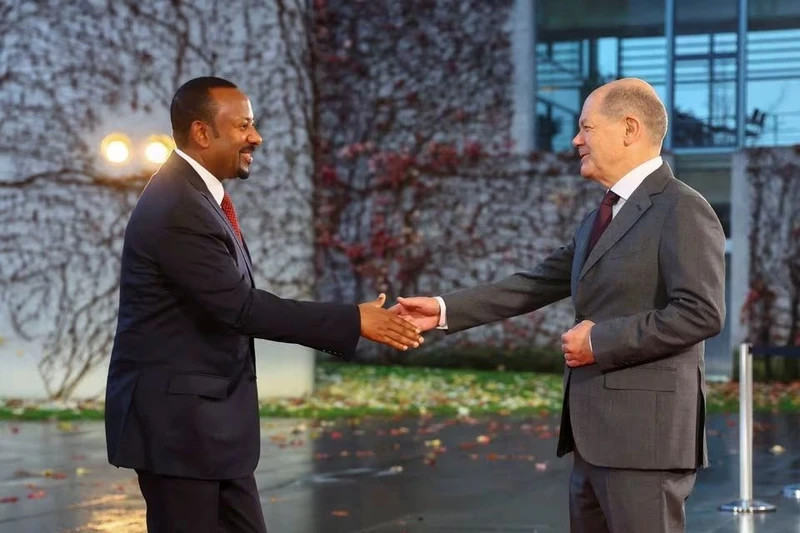Expanding relations with Africa is part of the foreign policy that has been promoted by the German Government to strengthen the role and position of the European economic "leader" on the African continent.
The above summit is held annually within the framework of the G20 Compact with Africa, with the expectation of strongly attracting investors to the African market. Germany launched this initiative in 2017 when Berlin held the role of G20 Presidency, with then German Prime Minister Angela Merkel chosing Africa as an important part of the G20 agenda.
This year's summit was held at the German Chancellery, under the chair of was held at the German Chancellery, to emphasised interest in Africa, among the European leaders attending this year's summit are European Commission President Ursula von der Leyen, French President Emmanuel Macron and Dutch Prime Minister Mark Rutte.
This is an opportunity for PM Scholz, who has visited Africa many times since taking office at the end of 2021, to conduct bilateral discussions with leaders of several African countries on the promotion of cooperation opportunities. PM Scholz made a trip to the southern Sahara Desert region.
During his visit to Ghana, German Prime Minister Olaf Scholz said that this country and the European Union (EU) are both committed to strengthening security in the West African region and can provide equipment and training to support the fight against the activities of Islamic jihadists spreading in this area.
Prime Minister Scholz stressed that Germany is ready to support cross-border cooperation and the upcoming EU delegation to the Gulf of Guinea can provide equipment and training to further strengthen the close cooperation between the two sides in fighting terrorism.
Meanwhile, many German companies are looking to boost their business in Africa, especially in the fields such as green hydrogen and liquefied natural gas. According to head of the German-Africa Business Association Christoph Kannegiesser, in the context of Germany seeking to reduce its dependence on Russian gas, he realises the great potential of the energy sector in Africa.
He affirmed: "The field of green hydrogen and liquefied gas will give a new impetus in many countries." Typically, Senegal, Nigeria and Mauritania are countries with investment potential, while Namibia can benefit greatly from green hydrogen production. Namibia has huge advantages in geographical location compared to Europe.
Namibia's Skeleton Coast in the Atlantic Ocean is ideal for green hydrogen production thanks to its abundance of sun and wind. According to statistics from the German Ministry of Economics, this country's companies invested about 1.6 billion EUR in Africa in 2021, including 1.1 billion EUR in the South Sahara Desert.
Visiting Nigeria at the end of October, the German Prime Minister expressed his desire to invest in the gas sector and important minerals in Nigeria. The German Prime Minister's visit to Africa's leading economy aims to help Germany diversify its trading partners and expand cooperation in the energy sector.
In 2022, trade turnover between Germany and Nigeria increased by up to 50%, from 2 billion to 3 billion EUR. German Prime Minister Olaf Scholz said that businesses accompanying him on the visit have expressed interest in signing and promoting new agreements in Nigeria.
According to the German Prime Minister, Nigeria is an important market and partner for the German economy. The German Prime Minister welcomed Nigeria's efforts to expand the capacity of liquefied natural gas (LNG) exploitation, adding that energy cooperation is an important area in the partnership between the two countries.
The German leader expressed that Berlin wants to achieve comprehensive progress in expanding cooperation in the field of renewable energy. Although detailed information is not released, Prime Minister Scholz revealed that German companies are also willing to participate in railway construction projects in Nigeria.
Bilateral trade turnover between Germany and Africa reached 60 billion EUR in 2022, an increase of 21.7% compared to 2021. According to research by auditing company KPMG and the German-Africa Business Association, nearly 67% of German companies want to expand their business in Africa.
Germany, and Europe in general, has been growing increasingly interested in new economic opportunities in the world's second most populous continent, especially opportunities to boost cooperation in developing green hydrogen, an energy source that can help Europe transform to a carbon neutral economy.
In addition, European countries helping to train anti-terrorism forces in West Africa will contribute to maintaining the stability and prosperity of the African continent. This is also the key to reducing illegal migration into Europe.
















